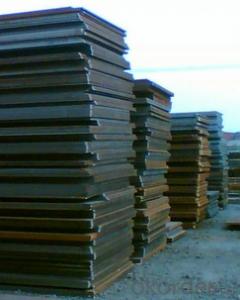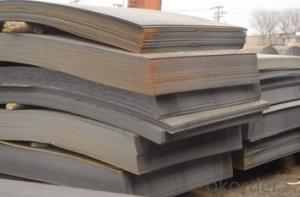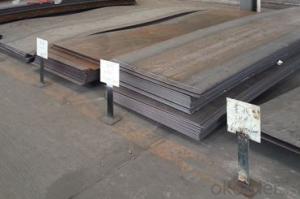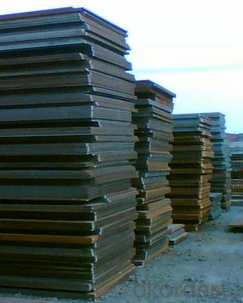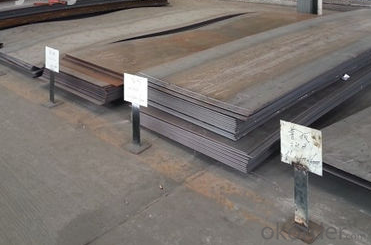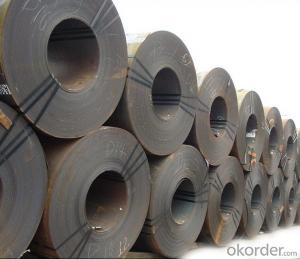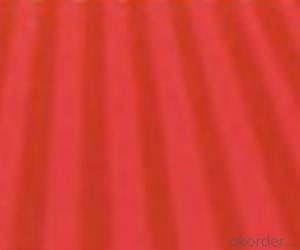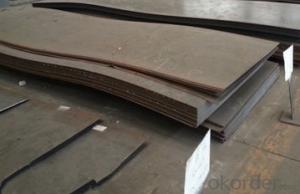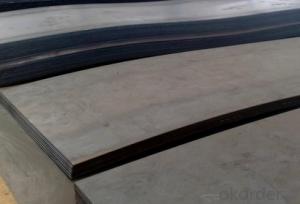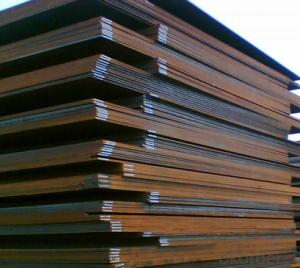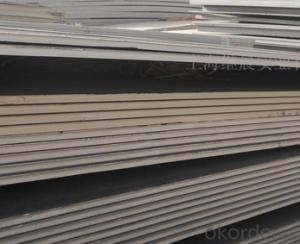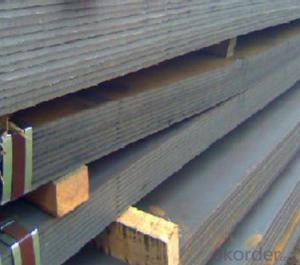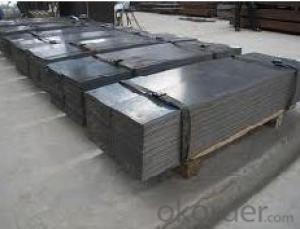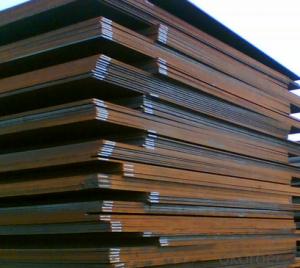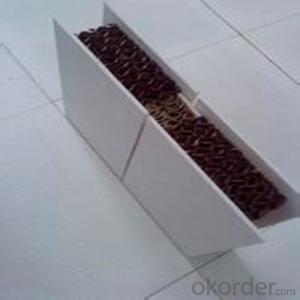Hot Rolled Carbon Steel Plate,Carbon Steel Sheet Q235B, CNBM
- Loading Port:
- Qingdao
- Payment Terms:
- TT OR LC
- Min Order Qty:
- 10 pc
- Supply Capability:
- 30 pc/month
OKorder Service Pledge
OKorder Financial Service
You Might Also Like
Quick Details
| Standard: | AISI, ASTM, GB, JIS | Grade: | Q195,Q235,Q345,A36,C45 | Thickness: | 1.0-30MM |
| Model Number: | Q235,Q195,Q345 | ||||
| Type: | Steel Plate | Technique: | Hot Rolled | Surface Treatment: | Coated |
| Application: | Ship Plate | Special Use: | Silicon Steel | Width: | 30-2000mm |
| Length: | as your requirement | standard: | hot rolled | Surface: | Anti-rust oil |
Packaging & Delivery
| Packaging Details: | seaworthy packages or as customers' require |
| Delivery Detail: | within 15 days after the advance payment |
Hot rolled steel plate
1 carbon steel plate 3mm thick General information
| Product name | Type | Specification | Implementation of GB | ||
| thick | wide | long | |||
| Carbon structural steel | Q195,Q215, Q235A,Q235B, Q235C,Q255, Q275 | 4-120 | 1500-4500 | 6000-12000 | GB/T700-2006 |
| Low-alloy structural steel | Q295,Q345A, Q345B,Q2345C | 4-120 | 1500-4500 | 6000-12000 | BG/T1591-1994 |
| Quality carbon structural stee | 30-50 | 4-120 | 1500-4500 | 6000-12000 | BG/T699-1999 |
| Ship steel | CCSA,CCSB | 4-120 | 1500-4500 | 6000-12000 | materials and welding condition |
| CCSAH32,CCSAH36 CCSDH32,CCSDH36 | 4-120 | 1500-4500 | 6000-12000 | materials and welding condition or GB 712-2000 | |
| Boiler steel | 20g,22Mng, 16Mng,19Mng | 4-120 | 1500-4500 | 6000-12000 | GB 713-1997 |
| Pressure vessel steel | 1622Mng,20R, 15MnVR,15MnVNR | 4-120 | 1500-2700 | 6000-12000 | GB 6654-1996 |
| European standard plate
| S235JR,S235J0, S275JR,S275J0, S275JR2,S355JR, S355J0,S355J2 | 4-120 | 1500-4500 | 6000-12000 | EN 10025 |
| Japanese standard plate | SS400,SS400-B | 4-120 | 1500-4500 | 6000-12000 | JIS G3101-2004 |
2 carbon steel plate 3mm thick detail specification
Material:
A283Gr.D/A573Gr.65,A516Gr65,A516Gr70,A284Gr.D
SS400,SS300,CCSB A36,A32,LRA32,LRB,Q235
Q195,Q235,Q345,SS400,ASTM A36,E235B
Thickness: 4mm-120mm
width: 1500mm-4500mm
Length:2-10m ,accordingly
Thickness | 4-120mm |
Width | 1500-4500mm or as custom's request |
Length | 2-12m,as your requirment |
Technique | Cold rolled or hot rolled |
Surface treatment | Bare, galvanized coated or as customer's requirements. |
Standard | ASTM,EN,GB,JIS,GB |
Material | A283Gr.D/A573Gr.65,A516Gr65,A516Gr70,A284Gr.D SS400,SS300,CCSB A36,A32,LRA32,LRB,Q235 Q195,Q235,Q345,SS400,ASTM A36,E235B |
Terms of Payment | L/C or T/T |
Chemical composition | C≤0.004%;Si≤0.030%; Mn ≤0.17%;P≤0.012%; S≤0.010%; Fe balance |
Delivery Detail | within 30days once receive deposite or confirm L/C |
Packing | Standard export packing,or as requirement |
3 carbon steel plate 3mm thick application:
construction,machinery manufacturing, container manufacturing, shipbuilding, bridge construction. Can also be used to manufacture a variety of containers, the furnace shell, furnace plate, bridge and vehicle static steel plate, low alloy steel plate,shipbuilding plate, boiler plate, pressure vessel plate, pattern plate, tractor parts, automobile frame steel plate and welding components
- Q: What are the different quality standards for steel sheets?
- There are several different quality standards for steel sheets, which are used to ensure that the material meets specific requirements and is suitable for its intended use. Some of the most common quality standards for steel sheets include: 1. ASTM A36/A36M: This standard specifies the requirements for carbon structural steel, including steel sheets, used in general structural purposes. It outlines the chemical composition, mechanical properties, and other relevant factors. 2. ASTM A568/A568M: This standard covers the general requirements for steel sheet products, including hot-rolled, cold-rolled, and coated sheets. It provides specifications for dimensions, tolerances, and surface quality. 3. EN 10130: This European standard specifies the requirements for cold-rolled low carbon steel flat products, including steel sheets. It outlines the chemical composition, mechanical properties, and other relevant factors. 4. JIS G 3302: This Japanese industrial standard covers the requirements for hot-dip zinc-coated steel sheets and coils. It includes specifications for the coating weight, surface finish, and mechanical properties. 5. ISO 3574: This international standard specifies the requirements for cold-reduced carbon steel sheet of commercial and drawing qualities. It provides guidelines for dimensions, tolerances, and mechanical properties. 6. GB/T 2518: This Chinese national standard outlines the requirements for continuous hot-dip zinc-coated steel sheets and coils. It includes specifications for the coating weight, surface finish, and mechanical properties. These quality standards help ensure that steel sheets are produced and supplied with consistent properties and characteristics, making them suitable for various applications such as construction, automotive, manufacturing, and more. It is important for manufacturers, suppliers, and end-users to adhere to these standards to ensure the quality and reliability of steel sheet products.
- Q: What is the minimum thickness of steel sheets?
- The minimum thickness of steel sheets can vary depending on the specific application and industry standards. However, typically, steel sheets are available in thicknesses ranging from 0.4mm to 6mm.
- Q: Can steel sheets be used for signage or advertising displays?
- Yes, steel sheets can be used for signage or advertising displays. Steel is a durable and versatile material that can be shaped, cut, and painted to create attractive and long-lasting signs and displays. Additionally, steel sheets can withstand outdoor conditions, making them suitable for both indoor and outdoor advertising purposes.
- Q: How do steel sheets perform in high-wind areas?
- Due to their inherent strength and durability, steel sheets are highly effective in high-wind areas. They offer excellent resistance against strong winds and are commonly used for roofs and walls in regions prone to hurricanes, tornadoes, or severe weather. The robust nature of steel allows it to withstand high wind speeds without any deformation or damage. Steel sheets are specifically designed and manufactured to meet wind load requirements, ensuring their ability to endure the forces generated by strong winds. This makes them a dependable choice for structures in high-wind areas. Furthermore, steel sheets are securely fastened to the underlying structure, further enhancing their resistance to wind. Proper installation techniques and fasteners are crucial in ensuring the sheets remain intact during extreme weather conditions. Additionally, steel sheets can be designed with interlocking profiles, providing an extra layer of protection against wind-driven rain and debris. In terms of maintenance, steel sheets require minimal upkeep in high-wind areas. They are resistant to rot, insect damage, and decay, which are major concerns in regions with high humidity and frequent rainfall. Moreover, steel sheets have a long lifespan, offering long-term protection against wind damage. However, it is vital to consider the overall design and construction of a building when evaluating the performance of steel sheets in high-wind areas. The structural integrity of the entire system, including the framing and connections, should be properly engineered to withstand expected wind loads. Sufficient bracing and reinforcement should also be incorporated into the building's design to ensure optimal performance and safety. In conclusion, steel sheets are an excellent option for high-wind areas due to their strength, durability, and ability to resist wind damage. When installed correctly and integrated into a well-designed structure, steel sheets provide reliable protection against strong winds, making them a preferred material in regions prone to severe weather conditions.
- Q: What are the different forms of steel sheets (flat, perforated, expanded, etc.)?
- Some different forms of steel sheets include flat sheets, perforated sheets, expanded sheets, and corrugated sheets.
- Q: Are steel sheets suitable for soundproofing applications?
- Yes, steel sheets can be suitable for soundproofing applications. Steel has good sound blocking properties due to its density and ability to reflect sound waves. However, for more effective soundproofing, steel sheets should be combined with other materials or used in a multi-layered construction to create a barrier against sound transmission.
- Q: What is the lifespan of steel sheets?
- The lifespan of steel sheets can vary depending on various factors such as the quality of the steel, the environment it is exposed to, and the level of maintenance. However, on average, steel sheets can last for several decades or even up to a century if properly maintained.
- Q: How do steel sheets perform in terms of energy efficiency?
- Steel sheets have excellent energy efficiency performance due to their high thermal conductivity, which allows for efficient heat transfer. Additionally, steel sheets are often used in construction for their insulating properties, reducing energy consumption for heating and cooling.
- Q: What is the weight of a typical steel sheet?
- The weight of a typical steel sheet can vary depending on its dimensions and thickness. However, on average, a standard steel sheet can weigh anywhere from 15 to 30 pounds per square foot.
- Q: How do steel sheets compare to other types of metal sheets?
- Steel sheets are generally considered to be superior to other types of metal sheets due to their strength, durability, and versatility. They have a high tensile strength, making them resistant to bending and breaking. Steel sheets also offer excellent corrosion resistance, making them suitable for various applications, including construction, automotive, and manufacturing industries. Additionally, steel sheets can be easily fabricated and manipulated, allowing for a wide range of shapes and sizes. Overall, steel sheets are highly regarded for their exceptional performance and reliability compared to other metal sheets.
Send your message to us
Hot Rolled Carbon Steel Plate,Carbon Steel Sheet Q235B, CNBM
- Loading Port:
- Qingdao
- Payment Terms:
- TT OR LC
- Min Order Qty:
- 10 pc
- Supply Capability:
- 30 pc/month
OKorder Service Pledge
OKorder Financial Service
Similar products
Hot products
Hot Searches
Related keywords
